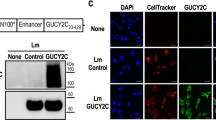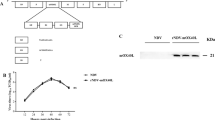Abstract
Purpose
Colorectal cancer is the third most frequent cancer in industrial nations. Therapeutic strategies to treat metastatic disease and prevent recurrence are needed. Anti-tumor immunity can be induced by dendritic cells. Dendritic cells can be expanded by the fms-like tyrosine kinase 3 ligand (Flt3L) in vivo. The aim of this study was to develop an adenoviral-based immune-gene therapy of colorectal cancer with Flt3L in a BALB/c mouse model.
Methods
A new Flt3L-encoding adenoviral vector (pAdFlt3L) was administered in two approaches in a CT26 colon cancer model in female BALB/c mice. In the therapeutic approach, pAdFlt3L was injected into the tail vein or directly into subcutaneous CT26 colon carcinoma tumors in BALB/c mice. In the vaccination protocol, mice were vaccinated with CT26 cell lysate and pAdFlt3L subcutaneous prior to subcutaneous application of vital CT26 cells.
Results
Application of pAdFlt3L led to high levels of Flt3L in vitro and in vivo. Significant expansion of dendritic cells after application of pAdFlt3L in vivo was confirmed by the use of CD11c and CD11b surface markers in immunohistochemistry and flow cytometry (p = 0.019). In the therapeutic approach, neither intravenous nor intratumoral treatments with pAdFlt3L lead to regression of CT26 tumors. In the vaccination protocol, vaccination completely prevented tumor growth and resulted in superior survival compared to control mice (p < 0.001).
Conclusions
Our results demonstrate that immunostimulatory therapy with pAdFlt3L is effective to prevent tumor development through vaccination and may represent a therapeutic tool to prevent metastatic disease.








Similar content being viewed by others
Abbreviations
- BSA:
-
Bovine serum albumin
- CT26 cells:
-
Colon carcinoma cell line
- DC:
-
Dendritic cells
- DMEM:
-
Dulbecco’s modified Eagle medium supplemented with 10 % heat-inactivated fetal bovine serum
- Flt3L:
-
Fms-like tyrosine kinase 3 receptor ligand
- FCS:
-
Heat-inactivated fetal bovine serum
- FITC:
-
Fluorescein isothiocyanate
- FACS:
-
Fluorscence activated cell sorter flow cytometry
- GM-CSF:
-
Granulocyte macrophage colony stimulating factor
- GFP:
-
Green fluorescent protein (GFP)
- HEK-293 cells:
-
Human embryonic kidney cell line
- MOI:
-
Multiplicity of infection
- pAdFlt3L:
-
Replication-deficient adenoviral vector encoding for Flt3L and GFP
- pAdGFP:
-
Replication-deficient adenoviral vector encoding for GFP
- PBS:
-
Phosphate-buffered saline
- RIPA-buffer:
-
50, 150 mM sodiumchloride, 1 % Nonidet p-40, 0.5 % sodiumdeoxycholate, 1 % sodium dodecyl sulfate
- Rpm:
-
Runs per minute
- SDS:
-
Sodium dodecyl sulfate-plyacrylamide
- TBS:
-
Tris-buffered saline
- TBS Tween:
-
TRis-biffered saline Tween
References
Andre T, Afchain P, Barrier A, Blanchard P, Larsen AK, Tournigand C, Louvet C, de Gramont A (2007) Current status of adjuvant therapy for colon cancer. Gastrointest Cancer Res 1:90–97
Austyn JM (1996) New insights into the mobilization and phagocytic activity of dendritic cells. J Exp Med 183:1287–1292
Banchereau J, Steinman RM (1998) Dendritic cells and the control of immunity. Nature 392:245–252
Banchereau J, Briere F, Caux C, Davoust J, Lebecque S, Liu YJ, Pulendran B, Palucka K (2000) Immunobiology of dendritic cells. Annu Rev Immunol 18:767–811
Bernt KM, Ni S, Tieu AT, Lieber A (2005) Assessment of a combined, adenovirus-mediated oncolytic and immunostimulatory tumor therapy. Cancer Res 65:4343–4352
Berzofsky JA, Ahlers JD, Janik J, Morris J, Oh S, Terabe M, Belyakov IM (2004) Progress on new vaccine strategies against chronic viral infections. J Clin Invest 114:450–462
Bjorck P (2001) Isolation and characterization of plasmacytoid dendritic cells from Flt3 ligand and granulocyte-macrophage colony-stimulating factor-treated mice. Blood 98:3520–3526
Borges L, Miller RE, Jones J, Ariail K, Whitmore J, Fanslow W, Lynch DH (1999) Synergistic action of fms-like tyrosine kinase 3 ligand and CD40 ligand in the induction of dendritic cells and generation of antitumor immunity in vivo. J Immunol 163:1289–1297
Burt RW (2000) Colon cancer screening. Gastroenterology 119:837–853
Chouaib S, Asselin-Paturel C, Mami-Chouaib F, Caignard A, Blay JY (1997) The host-tumor immune conflict: from immunosuppression to resistance and destruction. Immunol Today 18:493–497
Christofori G (2006) New signals from the invasive front. Nature 441:444–450
Fearnley DB, Whyte LF, Carnoutsos SA, Cook AH, Hart DN (1999) Monitoring human blood dendritic cell numbers in normal individuals and in stem cell transplantation. Blood 93:728–736
Fong L, Hou Y, Rivas A, Benike C, Yuen A, Fisher GA, Davis MM, Engleman EG (2001) Altered peptide ligand vaccination with Flt3 ligand expanded dendritic cells for tumor immunotherapy. Proc Natl Acad Sci USA 98:8809–8814
Gabrilovich DI, Nadaf S, Corak J, Berzofsky JA, Carbone DP (1996) Dendritic cells in antitumor immune responses. II. Dendritic cells grown from bone marrow precursors, but not mature DC from tumor-bearing mice, are effective antigen carriers in the therapy of established tumors. Cell Immunol 170:111–119
Hadler-Olsen E, Wetting HL, Ravuri C, Omair A, Rikardsen O, Svineng G, Kanapathippillai P, Winberg JO, Uhlin-Hansen L (2011) Organ specific regulation of tumour invasiveness and gelatinolytic activity at the invasive front. Eur J Cancer 47:305–315
He TC, Zhou S, da Costa LT, Yu J, Kinzler KW, Vogelstein B (1998) A simplified system for generating recombinant adenoviruses. Proc Natl Acad Sci USA 95:2509–2514
He Y, Pimenov AA, Nayak JV, Plowey J, Falo LD Jr, Huang L (2000) Intravenous injection of naked DNA encoding secreted flt3 ligand dramatically increases the number of dendritic cells and natural killer cells in vivo. Hum Gene Ther 11:547–554
Jemal A, Siegel R, Ward E, Hao Y, Xu J, Thun MJ (2009) Cancer statistics, 2009. CA Cancer J Clin 59:225–249
Kanerva A, Hemminki A (2005) Adenoviruses for treatment of cancer. Ann Med 37:33–43
Luo J, Deng ZL, Luo X, Tang N, Song WX, Chen J, Sharff KA, Luu HH, Haydon RC, Kinzler KW, Vogelstein B, He TC (2007) A protocol for rapid generation of recombinant adenoviruses using the AdEasy system. Nat Protoc 2:1236–1247
Lyman SD, James L, Vanden Bos T, de Vries P, Brasel K, Gliniak B, Hollingsworth LT, Picha KS, McKenna HJ, Splett RR et al (1993a) Molecular cloning of a ligand for the flt3/flk-2 tyrosine kinase receptor: a proliferative factor for primitive hematopoietic cells. Cell 75:1157–1167
Lyman SD, James L, Zappone J, Sleath PR, Beckmann MP, Bird T (1993b) Characterization of the protein encoded by the flt3 (flk2) receptor-like tyrosine kinase gene. Oncogene 8:815–822
Lyman SD, Brasel K, Rousseau AM, Williams DE (1994) The flt3 ligand: a hematopoietic stem cell factor whose activities are distinct from steel factor. Stem Cells 12(Suppl 1):99–107; discussion 108–110
Macatonia SE, Hsieh CS, Murphy KM, O’Garra A (1993) Dendritic cells and macrophages are required for Th1 development of CD4+ T cells from alpha beta TCR transgenic mice: IL-12 substitution for macrophages to stimulate IFN-gamma production is IFN-gamma-dependent. Int Immunol 5:1119–1128
Maraskovsky E, Brasel K, Teepe M, Roux ER, Lyman SD, Shortman K, McKenna HJ (1996) Dramatic increase in the numbers of functionally mature dendritic cells in Flt3 ligand-treated mice: multiple dendritic cell subpopulations identified. J Exp Med 184:1953–1962
Meyerhardt JA, Mayer RJ (2005) Systemic therapy for colorectal cancer. N Engl J Med 352:476–487
O’Connell MJ (2009) Oxaliplatin or irinotecan as adjuvant therapy for colon cancer: the results are in. J Clin Oncol 27:3082–3084
Pande K, Ueda R, Machemer T, Sathe M, Tsai V, Brin E, Delano MJ, Van Rooijen N, McClanahan TK, Talmadge JE, Moldawer LL, Phillips JH, LaFace DM (2009) Cancer-induced expansion and activation of CD11b+ Gr-1+ cells predispose mice to adenoviral-triggered anaphylactoid-type reactions. Mol Ther 17:508–515
Pulendran B (2004) Immune activation: death, danger and dendritic cells. Curr Biol 14:R30–R32
Pulendran B, Banchereau J, Burkeholder S, Kraus E, Guinet E, Chalouni C, Caron D, Maliszewski C, Davoust J, Fay J, Palucka K (2000) Flt3-ligand and granulocyte colony-stimulating factor mobilize distinct human dendritic cell subsets in vivo. J Immunol 165:566–572
Pulendran B, Palucka K, Banchereau J (2001) Sensing pathogens and tuning immune responses. Science 293:253–256
Rahbari NN, Lordick F, Fink C, Bork U, Stange A, Jager D, Luntz SP, Englert S, Rossion I, Koch M, Buchler MW, Kieser M, Weitz J (2012) Resection of the primary tumour versus no resection prior to systemic therapy in patients with colon cancer and synchronous unresectable metastases (UICC stage IV): SYNCHRONOUS—a randomised controlled multicentre trial (ISRCTN30964555). BMC Cancer 12:142
Sallusto F, Cella M, Danieli C, Lanzavecchia A (1995) Dendritic cells use macropinocytosis and the mannose receptor to concentrate macromolecules in the major histocompatibility complex class II compartment: downregulation by cytokines and bacterial products. J Exp Med 182:389–400
Seth P (2005) Vector-mediated cancer gene therapy: an overview. Cancer Biol Ther 4:512–517
Steinman RM (1991) The dendritic cell system and its role in immunogenicity. Annu Rev Immunol 9:271–296
Uthman IW, Gharavi AE (2002) Viral infections and antiphospholipid antibodies. Semin Arthritis Rheum 31:256–263
Vremec D, Lieschke GJ, Dunn AR, Robb L, Metcalf D, Shortman K (1997) The influence of granulocyte/macrophage colony-stimulating factor on dendritic cell levels in mouse lymphoid organs. Eur J Immunol 27:40–44
Zhang S, Cui Y, Weng Z, Gong X, Chen M, Zhong B (2009) Changes on the disease pattern of primary colorectal cancers in Southern China: a retrospective study of 20 years. Int J Colorectal Dis 24:943–949
Acknowledgments
The authors thank Stefan Urban and Anke Lonsdorf for helpful discussion. We also thank Ulrike Protzer for kindly providing pAdGFP and Sabine Tuma and Jasmin Geib for their excellent technical assistance.
Conflict of interest
None.
Author information
Authors and Affiliations
Corresponding author
Rights and permissions
About this article
Cite this article
Riediger, C., Wingender, G., Knolle, P. et al. Fms-like tyrosine kinase 3 receptor ligand (Flt3L)-based vaccination administered with an adenoviral vector prevents tumor growth of colorectal cancer in a BALB/c mouse model. J Cancer Res Clin Oncol 139, 2097–2110 (2013). https://doi.org/10.1007/s00432-013-1532-z
Received:
Accepted:
Published:
Issue Date:
DOI: https://doi.org/10.1007/s00432-013-1532-z




